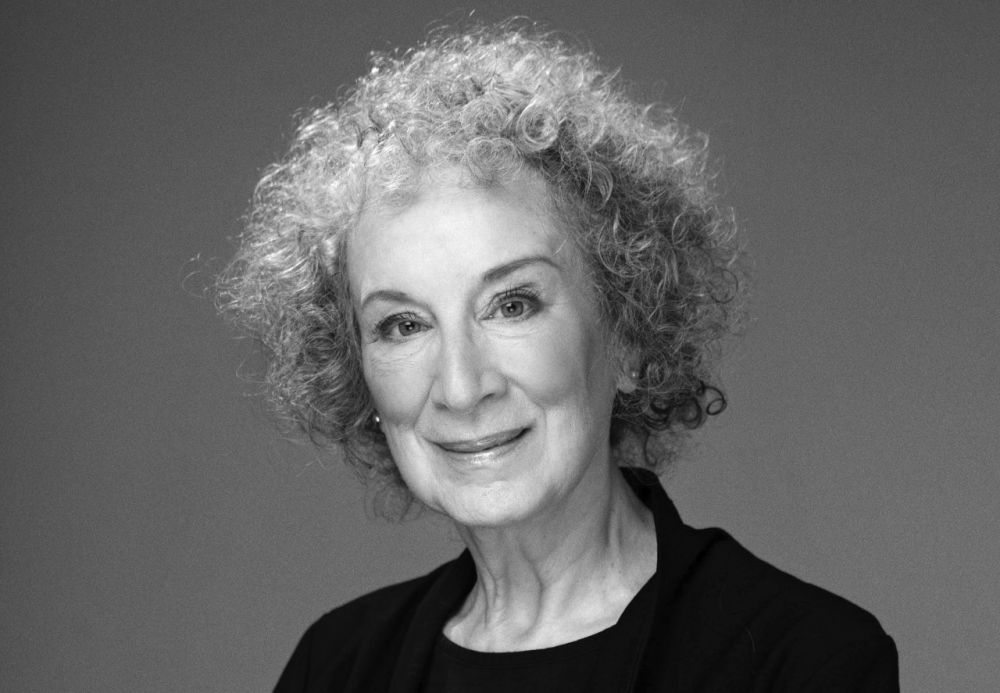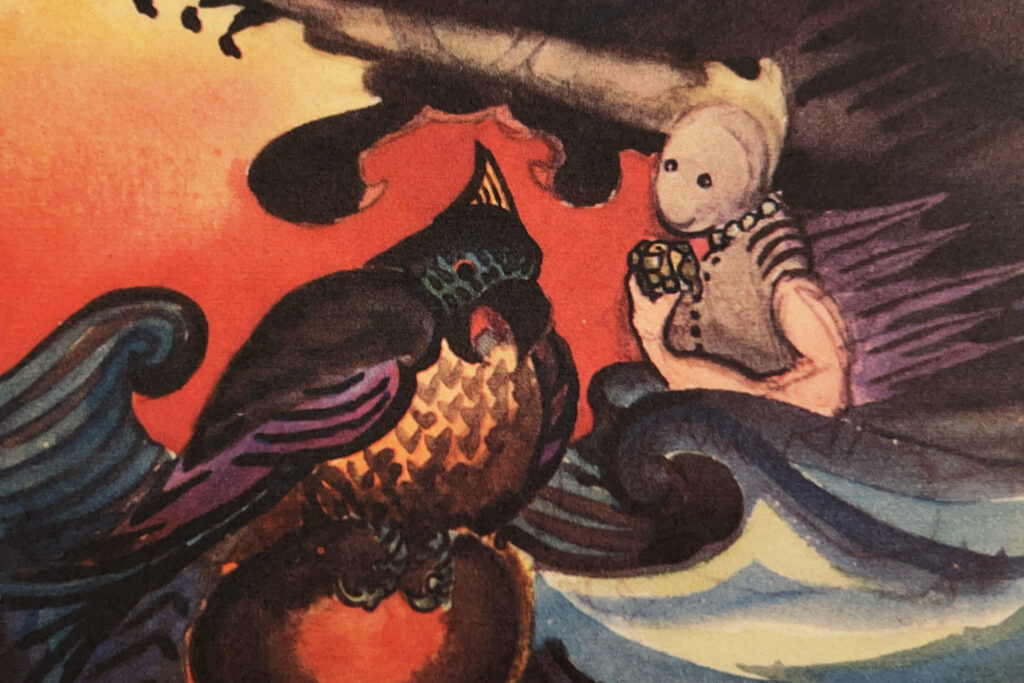Issue 117, Winter 1990

The manuscript of “Frogless,” a poem that appears in this issue, by Margaret Atwood. Ms. Atwood wrote the poem on an SAS Hotel’s bedside notepad while she was in Gothenburg, Sweden last September for the Nordic Book Fair. “I’ve written quite a lot under those circumstances. Perhaps it’s being in a hotel room or a plane with no ringing phone and no supervision. Also, there’s something about jet lag that breaks down the barriers.”
Margaret Atwood was born in Ottawa, Ontario in 1939. As a child, she lived in the wilderness of northern Quebec and also spent time in Ottawa, Sault Sainte Marie, and Toronto. She was eleven before she attended a full year of school. In high school Atwood began to write poetry inspired by Edgar Allen Poe, and at sixteen she committed herself to a writing career, publishing a collection of poems, Double Persephone, six years later.
Her second book of poetry, The Circle Game, earned her the Governor General’s Award—Canada’s highest literary honor—and from that time forward she has been a dominant figure in Canadian letters. In 1972 Atwood sparked a hot debate when she published a controversial critical study of Canadian literature, Survival: A Thematic Guide to Canadian Literature. In it she claimed that Canadian literature reflects the submissive as well as survivalist tendencies of the country, born from its being a subordinate ally to the United States, a former colony, and a country with vast stretches of untamed land. Following the publication of this volume, Atwood retreated from Toronto, where she had been working as an editor at the publishing house Anansi, to a farm in Alliston, Ontario, where she began to write full time.
Atwood has published nineteen collections of poetry—including The Circle Game (1964), The Journals of Susanna Moodie (1970), Power Politics (1971), You Are Happy (1974), True Stories (1981) and Interlunar (1984)—but she is best known for her novels, which include Surfacing (1972), Lady Oracle (1976), and Cat’s Eye (1988). Her most widely read novel is The Handmaid’s Tale (1986), a chilling account of a puritanical theocracy that won Atwood a second Governor General’s Award and was recently made into a motion picture. She is also the author of two children’s books, Up in the Tree (1978) and Anna’s Pet (1980) and two collections of short stories, Dancing Girls (1977) and Bluebeard’s Egg (1983). She has edited Oxford anthologies of Canadian verse and Canadian short stories and, with Shannon Ravenel, the 1989 volume of The Best American Short Stories.
The question of the status of women has frequently been an issue in Atwood’s work, and feminists have seized upon her writing as a product of the movement. Atwood has also made other political and philosophical issues themes in her work, such as Canada’s struggle to create an identity and, in recent years, her concern for human rights.
This interview was conducted in a house near Princeton University, where Atwood had gone to give some readings and lectures. In person, Atwood is much as one might expect from reading her work—incisive. For many hours over a period of two days, while teenage boys bounced basketballs and played music outside, people walked in and out, and football games played on the television in the next room, Atwood sat, attentive, answering each question without hesitation. She never strayed from her point, never seemed to tire, and remained, like a narrator from any one of her books, unflappable.
INTERVIEWER
Has the theme of survival always been intrinsic to your work?
MARGARET ATWOOD
I grew up in the north woods of Canada. You had to know certain things about survival. Wilderness survival courses weren’t very formalized when I was growing up, but I was taught certain things about what to do if I got lost in the woods. Things were immediate in that way and therefore quite simple. It was part of my life from the beginning.
INTERVIEWER
When did you make the leap from considering survival to be a physical battle to considering it to be an intellectual or political struggle?
ATWOOD
When I started thinking about Canada as a country it became quite evident to me that survival was a national obsession. When I came to the States in the sixties, I felt that nobody knew where Canada was. Their brother may have gone there to fish or something. When I was at Harvard, I was invited as a “foreign student” to a woman’s house for an evening for which I was asked to wear “native costume.” Unfortunately I’d left my native costume at home and had no snowshoes. So there I was, without native costume with this poor woman and all this food, sitting around waiting for the really exotic foreign students in their native costumes to turn up—which they never did because, as everybody knew, foreign students didn’t go out at night.
INTERVIEWER
You’ve written about the theme of foreignness a good deal.
ATWOOD
Foreignness is all around. Only in the heart of the heart of the country, namely the heart of the United States, can you avoid such a thing. In the center of an empire, you can think of your experience as universal. Outside the empire or on the fringes of the empire, you cannot.
INTERVIEWER
In your afterword to The Journals of Susanna Moodie you write that if the mental illness of the United States is megalomania, that of Canada is paranoid schizophrenia. Could you say something more about that?
ATWOOD
The United States is big and powerful; Canada is divided and threatened. Maybe I shouldn’t have said “illness.” Maybe I should have said “state of mind.” Men often ask me, Why are your female characters so paranoid? It’s not paranoia. It’s recognition of their situation. Equivalently, the United States’s feeling that it is big and powerful is not a delusion. It is big and powerful. Possibly, its wish to be even bigger and more powerful is the mentally ill part. Every Canadian has a complicated relationship with the United States, whereas Americans think of Canada as the place where the weather comes from. Complication is a matter of how you perceive yourself in an unequal power relationship.
INTERVIEWER
How do you view Canada and its literature within this political relationship?
ATWOOD
Canada is not an occupied country. It’s a dominated country. Things are more clear-cut in an occupied country—the heroes and the villains are obvious. One of the complicating things, of course, is that the United States will eagerly swallow anything. It’s very welcoming in that way. Canadian writers often find that they have a better time in the United States than they do in Canada, because living in Canada is to some extent like living in a small town. They will rally around you when you break your leg, but on the other hand, if you get too big for your britches, well, they perceive it as exactly that. Alice Munro’s book, which is titled The Beggar Maid in the United States, is called Who Do You Think You Are? in Canada . . . as in, Who do you think you are, behaving like that—the Prime Minister? The U.S. loves success, the American dream that anybody can be president of the United States or get into Peoplemagazine. But with Canadians, it’s much more likely to be, You know, people might not like it if you did that. There are a lot more snipers in the bushes.
INTERVIEWER
Where have you been treated better as a writer, would you say?
ATWOOD
I suffer more vicious attacks, more personal attacks, in Canada, because that’s where I’m from. Families have their most desperate fights among themselves, as we know. However, if you look at per capita sales figures, people recognizing me in the street, of course it’s more in Canada. If I sold as many books per capita in the United States as in Canada, I’d be a billionaire.
INTERVIEWER
Is it more difficult for women to get published than men?
ATWOOD
I’m afraid the question is simply too broad. Do we mean, for instance, in North America, or in Ireland, or in Afghanistan? There are categories other than gender. Age, class and color, for instance. Region. National origin. Previous publication. Sexual orientation. I suppose we could rephrase the question and ask, is it more difficult for a first novelist who is female than for her male counterpart of the same age, class, color, national origin or location, and comparable talent, whatever that may be. Judging from the experience of Latin American female writers—of which there are many, though few are known in translation—the answer would be, yes. Women in many countries find it difficult to get published at all—consider the Middle East, for instance. Or black women in South Africa. In fact, they find it difficult to write. Or difficult to become educated. The barriers to women writing are often put in place at a very early age and in very basic ways.
But if we’re just talking about, say, North America, obviously commercial publishers want to publish things they can sell. Whether such publishers will publish a given book— whether by a man, woman, or turtle—depends a lot on what they think its reception will be. I don’t think there’s an overt policy against books by women or an overt quota. Much depends on the book and on the intuition of the publisher. It’s true, however, that the majority of books that do appear are still written by men and reviewed by men. Then there’s the subject of reviewing. That’s where you’re most likely to see gender bias, bias of all kinds.




